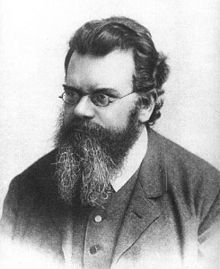Boltzmann brain
The Boltzmann brain (also freak observer ) is a hypothesis named after the Austrian physicist Ludwig Boltzmann , which states that what mankind perceives as reality could be nothing other than the imagination of a brain that is caused by random, brief fluctuations in the vacuum originated (whereby this does not mean vacuum fluctuations from the quantum field theory developed later ). According to this hypothesis, life and the universe could be a single thought .
The English mathematician Roger Penrose estimated the probability that the universe in which we live is exactly as we are currently seeing it: it is 1 to . On the other hand, the probability of a Boltzmann brain created by fluctuating the vacuum with memories of events that did not take place and false sensory impressions seems to be many times higher at 1 . Even if most scientists question this theory , it can not be ruled out with current means and methods of science .
Emergence
Particle-antiparticle pairs also arise in a vacuum as a result of fluctuations, which immediately destroy each other again. These fluctuations can occur anywhere in the universe and are mostly limited to individual pairs of matter and antimatter . Based on the assumption that the universe has already existed for an infinite period of time or will exist for an infinite amount of time and is infinitely large or will be infinitely large, the random creation of several pairs at a certain time in a certain place in the universe also creates significantly more complex ones Constructions such as a functioning brain with memories of never-before-seen events and false sensory impressions.
literature
- Dennis Overbye: Big Brain Theory: Have Cosmologists Lost Theirs? In: The New York Times . January 15, 2008, ISSN 0362-4331 ( nytimes.com [accessed October 16, 2019]).
See also
Web links
Individual evidence
- ↑ a b Boltzmann-Hirne, Part 1: Why you most likely do not exist. In: scienceblogs.de. August 6, 2019, accessed on October 16, 2019 (German).
- ↑ a b Werner Stangl: Boltzmann brain. In: lexikon.stangl.eu. Retrieved October 16, 2019 .
- ↑ a b c d e f g Riedochse: Boltzmann brains | The introverse. In: introversum.de. April 3, 2016, accessed on October 16, 2019 (German).
- ↑ Dennis Overbye: Big Brain Theory: Have Cosmologists Lost Theirs? In: The New York Times . January 15, 2008, ISSN 0362-4331 ( nytimes.com [accessed October 16, 2019]).


